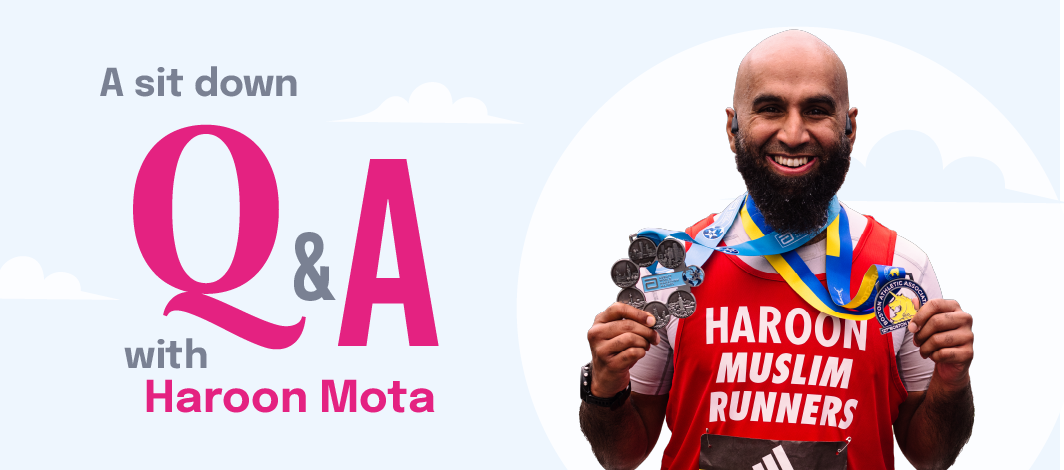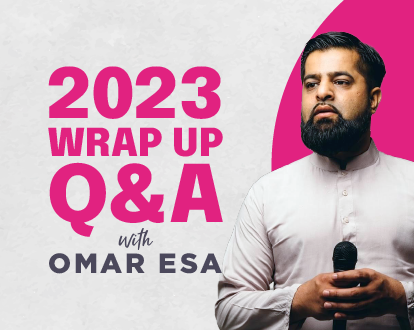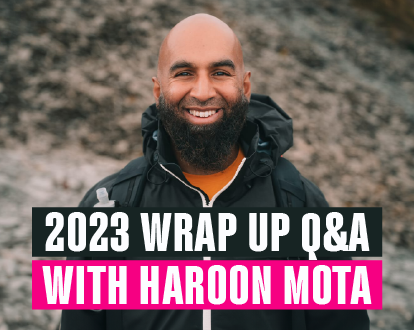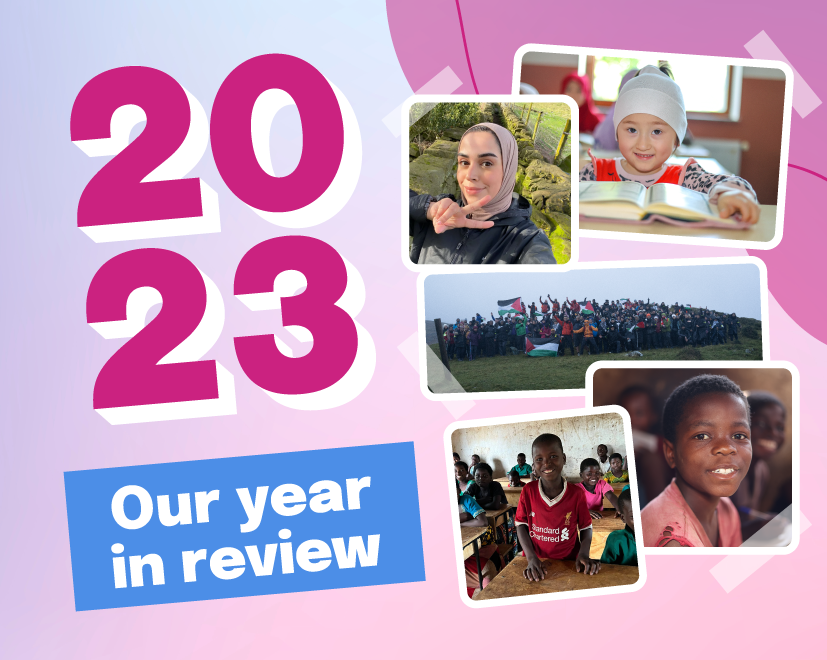We're delighted to have invited Haroon, our brand ambassador, to answer a few questions on running the Boston Marathon, training during Ramadan while fasting, sharing some top tips and spreading motivation to fundraise.
So, over to you, Haroon...
1–What makes you passionate about marathons specifically?
There are lots of reasons I love marathons. The main one is probably the mental space it gives me. Running is a time to process your emotions – to think, reflect and contemplate.
The physical fitness aspect actually comes secondary. I set myself a lot of goals: sleep, nutrition, body weight, and which marathons to run. It’s hard to explain, but there’s something euphoric about working so hard toward a goal and finally achieving it.
People always assume marathons get easier the more you do them – but you’re constantly finding ways to push yourself further and faster, so they become more difficult but just as rewarding.
2–How do you go about training for a marathon?
Whenever you train for an endurance sport like running, it’s best to take a holistic approach. It’s not as simple as just going for a run – you have to alter your whole lifestyle to get the best out of it. For example, I pay extra attention to hydration and nutrition, prioritise sleep and sacrifice social time.
Of course, running and exercise are still vital parts of training. I go for short fast runs and long slow runs, hitting a total of 40 miles each week. And that’s on top of interval training, tempo sessions and strength training in the gym. Not to mention hiking on the weekend with Muslim Hikers!
If you want to be the best you can be, you can’t take shortcuts. Sometimes it means holding true to your goals and maintaining discipline. It’s not easy, but it’s hugely rewarding when you finally achieve your goal.
3–Has your running mindset helped you outside the world of marathons?
I love training, but it requires a great deal of discipline and consistency. Running is uncomfortable – but you have to find a way to become comfortable in that uncomfortable situation. I never used to like running, but I enjoy developing mental strategies to help get me through difficult situations.
It’s this mindset that’s helped me get out of my comfort zone. For example, I quit my full-time job to set up the initiatives for the Active Inclusion Network. It was a risk, but Alhamdulilah it’s paid off.
4–What has running marathons helped you achieve?
My marathon journey may have started as a one-off fundraiser for charity, but it’s given me a way to champion good causes.
Part of the reason I run is to encourage change and inclusivity. When I started running, I quickly noticed how alone I was. I would turn up to running events in different cities all over the country and would often be the only Muslim amongst tens of thousands of people racing. I feel I have a responsibility to continue championing that change.
Marathons have also allowed me to fundraise for charity and encourage others to do so as well. I’ve seen first-hand how the Muslim charity sector has changed to involve challenge events like marathon running more regularly. It wasn’t too commonplace to run for a charity back when I ran the London Marathon for charity in 2012 but has since exploded in popularity.
5–How else do you champion inclusivity besides running marathons?
I set up the Active Inclusion Network so Muslims can build a community and feel more comfortable taking part in various sports. This includes Muslim Hikers, Muslim Runners and Muslim Cyclists.
These communities give Muslims the chance to start running, cycling or hiking, supported by a community and people like themselves they can approach for help. That social element is hugely important and really impacts their early experiences, encouraging them to continue.
6–What is it about the Active Inclusion Network that has attracted such a global following?
What the Active Inclusion Network offers is more than just confidence and a social community – it’s a familiarity and sense of shared relationships. I know what it’s like when you feel like you’re the only one with a particular hobby. But when you realise there’s a massive community out there who love the same things you do, you feel uplifted and empowered.
It can be difficult when you’re doing something on your own. But doing it with other people of the same cultural background can be extremely inspiring. If there are ever any obstacles in someone’s way, a community with a shared background and interests can help empower them.
7–When did you decide you wanted to become a six-star finisher?
It was only when I did the Berlin marathon in 2019 that I first heard about the six-star medal – and with two out of six marathons already under my belt, I decided I had to go for it.
My original plan was to do a fundraising challenge for four world major marathons in 2020: Chicago and New York, as well as London and Berlin again. Then the pandemic came…
I carried on training despite the uncertainty around the world and hoped they would still go ahead. But, slowly but surely, London was cancelled, then Berlin, and finally Chicago and New York were too. I hoped to run New York and Chicago marathons in 2021 when they reopened, but I couldn’t get past the travel restrictions.
When life started to return to normal, I managed to do New York and Chicago in 2022. I was so proud, but I couldn’t help noticing how few Muslims were aiming for this challenge. I felt that if I managed it, more Muslims would believe they could achieve world major marathons too.
8–What’s the atmosphere like when you run a marathon?
Every marathon has a different atmosphere, and every crowd gives off a different energy.
London is the best – I can’t think of any other marathon that matches that atmosphere. No matter the weather, you can guarantee that there will be crowds lining all 26 miles of the route.
It’s similar in Boston too. There was bad weather when I ran the Boston Marathon, but it didn’t stop the whole route from being crammed with people shouting encouragement to the runners. It’s ingrained in the city’s culture and its very being – and you can definitely feel that when you run!
9–Have you got your daughters involved in your marathons?
I grew up without any sporting role models from the Muslim community – it’s time to change that. I want to make sure future generations have those role models so they can believe they can be anything they want and do anything they set their minds to.
And that’s why I always encourage my daughters to get involved. I want them to be proud of their dad – that’s why I’m going to their school to do an assembly all about running a marathon and the importance of exercise.
I’m always taking them on hikes and getting them to join in and support me at marathons. I hope that by growing up surrounded by all this that it just becomes the norm for them. I want them to grow up thriving and getting the benefits from sports. They love meeting people and being part of the Muslim Hikers community. And it’s enriching and empowering for them, helping them develop and grow.
We need to stop making excuses for ourselves and enforcing the barriers we grew up with onto our children. If we grew up in families where sport wasn’t encouraged or parents denied us opportunities or suggested certain types of activities weren’t for us, it’s up to us to change that. We need to break that cycle and ensure our children say yes to opportunities and get out there to do whatever they want.
10–Why did you decide to fundraise for the Boston Marathon?
I haven’t fundraised for every marathon I’ve run. Some I just decided to complete as my own personal achievement. But the Boston Marathon was different.
It was my final six-star marathon, it fell in the month of Ramadan and I had just announced my ambassadorship for Charity Right. It was just perfect timing and a wonderful opportunity to fundraise for an important cause. It seemed like a no-brainer to me.
Alhamdullilah, I completed the marathon and managed to raise over £28,000 – enough to feed over 150 children school meals for an entire year.
I may have run all these marathons, but when I reflect on what I’ve achieved in my life, I can honestly say that the best thing I did was to make a difference in children’s lives and their futures.
11–How does it feel to finally be a six-star finisher?
Many people strive for this goal so they can relish in the recognition and title. But for me, it’s a sense of achievement and a legacy.
Yes, the physical medal is beautiful and will always remind me of how difficult the training and marathons were but how I succeeded anyway. I’m also proud of how my name is written in history as one of only 11,000 people in the world to have achieved this.
More importantly, still, I know very few Muslims to have achieved this and even fewer British Muslims. In fact, I only personally know of one other British Muslim to become a six-star finisher. I hope that my achievement will inspire others to write their name in the history books too.
12– What’s next for the Marathon Man?
There’s talk of adding the Cape Town and Sydney marathons for seven- and eight-star finisher medals, so I’d very much like to run those when they’re launched.
Here at Charity Right, we’d like to extend our heartfelt thanks to Haroon for his tireless efforts to fundraise and provide school meals during Ramadan. Congratulations again on achieving this historic milestone, and we look forward to all that’s to come.
May Allah SWT accept and reward all your sincere efforts, and make each moment of training a means of salvation and goodness for you in this world and the hereafter. Ameen.








